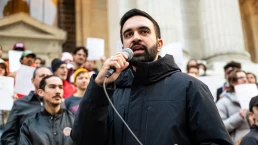The ongoing UAW strike, led by president Shawn Fain, is a marked departure from the union’s recent history. In many ways Fain is channeling early UAW leader Walter Reuther — before the union and Reuther himself downsized their ambitions.
by Barry Eidlin, Jacobin
A mid a year of attention-grabbing strikes, few have grabbed more attention than the United Auto Workers (UAW)’s ongoing strike against the Big Three automakers, launched on September 14. The union’s novel “stand-up strike” strategy, which involves targeted strikes that progressively ratchet up pressure on the companies, has kept the companies guessing while galvanizing public support. As auto company executives have found themselves in the awkward position of defending lavish stock buybacks and exorbitant pay for themselves, available polling suggests that the public supports the strikers by more than two to one.
With this week’s surprise announcement calling out an additional eighty-seven thousand workers at the Ford Kentucky Truck Plant, roughly one-quarter of the 150,000 autoworkers under the Big Three contracts are now on strike. While a comprehensive deal remains far off, the UAW’s targeted approach has already won major gains at all three automakers, including eliminating some tiers, reinstating cost-of-living (COLA) wage adjustments, winning the right to strike over plant closures, and, perhaps most impressive, bringing future electric vehicle (EV) production at General Motors (GM) under the master agreement.

The union’s approach to bargaining and striking is a sharp departure from the UAW of recent decades. Instead of allowing the companies to dictate concessions while keeping members in the dark during negotiations, the UAW leadership has staked out what it has described as an audacious, ambitious agenda that seeks to reclaim the union’s historic role as the standard-setter for the entire working class. It has actively involved members in the contract campaign and strike, and has encouraged and embraced member creativity on the picket line and in the plants, as autoworkers yet to be called out on strike have independently refused voluntary overtime and engaged in “work-to-rule” campaigns to slow down production.
Recent Posts
Politicians Are Betraying Gen Z On Climate
July 10, 2025
Take Action Now While Gen-Zers thrift, knit, crochet, and find other ways to reduce our footprints, Trump and the GOP are greenlighting more climate…
Trump’s Deportation Threat Against Zohran Mamdani Is Shameful
July 10, 2025
Take Action Now In only half a year of Donald Trump’s presidency, he and his allies have turned deportation into an explicitly political threat…
Teachers Union Votes To Cut Ties To The Anti-Defamation League
July 10, 2025
Take Action Now In a momentous vote, the National Education Association voted to cut all ties with the Anti-Defamation League. The reason? “Despite…
2025 War Abolisher Awards Go To Albanese, Nader, Waters
July 9, 2025
Take Action Now The purpose of the awards is to honor and encourage support for those working to abolish the institution of war itself.By World…




